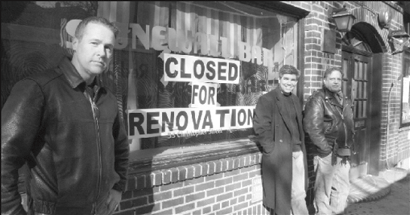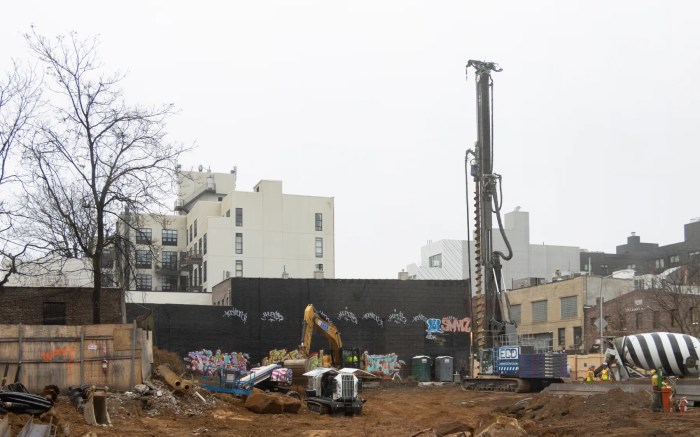By Brooke Edwards
The Stonewall nightclub at 53 Christopher St. in the West Village remains closed, but not for long. Just weeks away from reopening, Stonewall’s new owners have planned a classier version of the legendary gay venue while still paying homage to its history.
Stonewall, formerly known as the Stonewall Inn, is often referred to as the birthplace of the gay rights movement.
It was the location of the Stonewall Rebellion of 1969, in which hundreds of gays, lesbians and transgender people and their supporters for the first time finally fought back against the unwarranted and often violent police raids that had plagued New York City’s gay bars for decades.
Beginning on June 28, 1969, the riots lasted for three days, resulting in 13 arrests. Fueled by chants of “gay power,” it was the first major example of the L.G.B.T. community — who were previously viewed by the police as submissive and therefore an easy target — fighting back in large numbers.
In honor of the rebellion, New York City’s Gay Pride March is held on the last Sunday in June, a tradition many other cities have also picked up. In addition, many gay activist groups and bars around the world have used Stonewall in their names.
As a result of its tremendous impact, Stonewall, in 1999, became the first gay/lesbian site to be listed on the National Register of Historic Places.
In spite of its legacy and respect as a historic site, Stonewall has struggled as a nightclub ever since the rebellion. It was vacant throughout the 1970s and ’80s. Though it was renovated and reopened in the early ’90s, it soon changed owners and once again closed for remodeling.
Since opening again in the late ’90s, Stonewall managed to remain a fixture on the New York gay club scene. However, it also garnered a reputation for violating safety regulations and for being a bit on the raunchy side.
“They were using the wrong entrance that violated the permit they received,” said Doris Diether, a Community Board 2 member, of the previous management. “They were also apparently closing their curtains, which violates liquor laws, and we were told that they were doing some shows inside that were kind of naughty.”
After the last owners lost their lease in 2006, after failure to pay rent and liquor license violations, the future of Stonewall became uncertain. There were even rumors circulating about the venue being converted into a Starbucks.
That’s when Bill Morgan, Tony DeCicco and Kurt Kelly stepped in.
Morgan and DeCicco are co-owners of the Duplex Cabaret and Piano Bar next door to Stonewall. Kelly has been a bartender at Duplex for more than 15 years.
“We understood why it was so important to salvage Stonewall. It is very important to the neighborhood,” Morgan said.
Since taking over Stonewall in early January, the three co-owners have been working with a designer to restore the venue, though the process has not been easy.
“We’re right in the middle of renovations right now,” Morgan said. “There was a lot of work to be done because the building was left in such disrepair.”
The design plan for the new Stonewall, Morgan said, is to “…re-create a romantic idea of what the club would have been had it been properly maintained.”
But longtime Stonewall patrons like Warren Allen Smith — who was at the club on the second night of the 1969 rebellion — mostly recall that it was never a particularly romantic or well-maintained place.
“It was a dingy place,” Smith said. “But it was the only place where you could let your hair down and be free.”
Smith remembers signing his name in a book to be let into Stonewall, where he was met with watered-down drinks and rumors of the Mafia controlling the club.
Morgan said that they have not heard any concerns about taking away that grungy atmosphere that has traditionally been a part of Stonewall. On the contrary, he said, “I think people are ready to have a slightly nicer version of the club.” He described the new atmosphere as: “Not too fancy, still very public.”
The new décor of the club will involve lots of natural woods. Workers removed the sheets of chrome metal that lined the walls and installed wood paneling. They also stripped the original bar of what Morgan describes as “garish green and gold paint” to reveal the wood beneath.
“We are also giving a nod to the history of Stonewall,” Morgan said. “We are looking for archival photos of the club.”
As for the employees, Morgan said, “We will have some old staff and some new staff.” Returning staffers include the man known simply as Tree, who was bartending at Stonewall during the rebellion and throughout the club’s existence.
Stonewall is scheduled to re-open in two to three weeks, though Morgan said, “We’re probably going to open in stages.”
He said they will start by opening the main room on the first floor, which will still have a bar and dance floor. The room behind that will open next, with more of a lounge-style atmosphere. The last phase will be the main dance area upstairs, though they are still awaiting approval of a cabaret license for this area.
Although C.B. 2’s Diether said that the new owners would not be able to get a cabaret license for a second-floor venue, Morgan said that rule was based on a city variance that has now expired. Morgan said, “We are hopeful that the committee will take into consideration what good neighbors we have been at the Duplex and trust that we will do the same at Stonewall.”
The owners are also waiting on final approval of their liquor license, which they expect to come through any day. The process was slowed because they had to take care of existing violations left by the previous owners.
“Once we have all three rooms open, we’ll absolutely do a grand opening event,” said Morgan.
When asked about the impending rebirth of Stonewall, former patron Smith said, “It’s going to be more of a tourist site. I wish them well, but you can never replace Stonewall.”







































